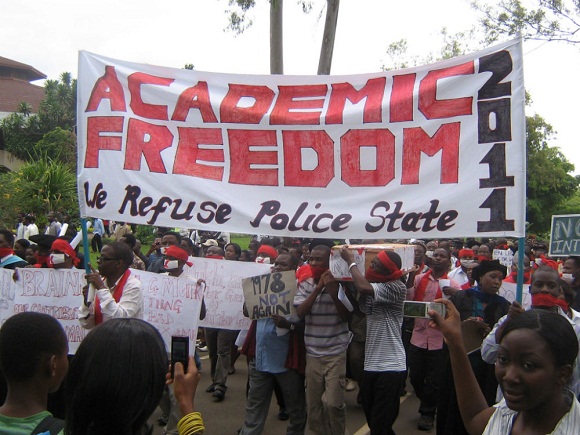University of Malawi students have sued the institution’s council for losses they incurred during an eight-month academic freedom protest by lecturers, who have in turn passed a vote of no confidence in the institution’s authorities.
After being slapped with a US$212,000 lawsuit by non-resident students, the university – the defendant in the matter – included lecturers and the attorney general as third parties in the legal action, in a bid to have academics and the authorities held liable for any compensation.
The university argued that the lecturers’ decision not to teach was not legally sanctioned under labour laws, while the inspector general of police also played a role by summoning political science lecturer Dr Blessings Chinsinga for questioning over a political example he cited in class.
The summoning of Chinsinga triggered the long strike, with academics claiming that the government of late president Bingu wa Mutharika was infringing on academic freedom. The impasse lasted for eight months, prejudicing students in the process.
Following Mutharika’s sudden death in April this year, new President Joyce Banda has moved to calm the higher education sector – but the university’s move to make lecturers pay for student losses could rock the boat.
Dr Jessie Kabwila-Kapasula, acting president of the Chancellor College Academic Staff Union (CCASU) at the time of the protests, and other lecturers, have since petitioned Banda to have the university council and management sacked, saying they have lost confidence in the institution’s leadership.
The academics argued that the university’s top management represents the past regime, which was bent on suffocating academic freedom in Malawi.
Kabwila-Kapasula confirmed the latest developments. “Yes, students have instituted a lawsuit,” she told University World News. Although the lawsuit was against the university authorities, “they decided to join me on behalf of CCASU as a third party”.
The university subsequently withdrew its court action to have lecturers pay students for losses incurred by the lecturer protests, following a threat by academics to take unspecified action within a week.
In their petition to Banda, lecturers warned that the university council’s lawsuit move could plunge higher education back into academic freedom protest days. They expressed conviction that the attempt to make them pay was a calculated strategy by a clique bent on sabotaging emerging harmony within the university and on creating chaos and conflict under the new dispensation.
The lecturers also reminded the president that they had terminated protests last year on condition that there would be no reprisals against staff and students who stood in defence of academic freedom.
They added that at an academic freedom symposium held in June, Banda had stated that her personal and government role was to defend academic freedom as enshrined in the constitution, a statement that gave lecturers hope and vindication that their cause was just.
“In our considered view, council and top university management, in its present status, represents residual particles of the past regime that was bent on suffocating academic freedom in Malawi,” said the lecturers in their note to Banda. Their continued presence was a “recipe for tension and conflict” at the university.
It remains to be seen what action – if any – Banda might take regarding the allegation that the university’s leaders represent residual particles of the past regime of the late Mutharika.

